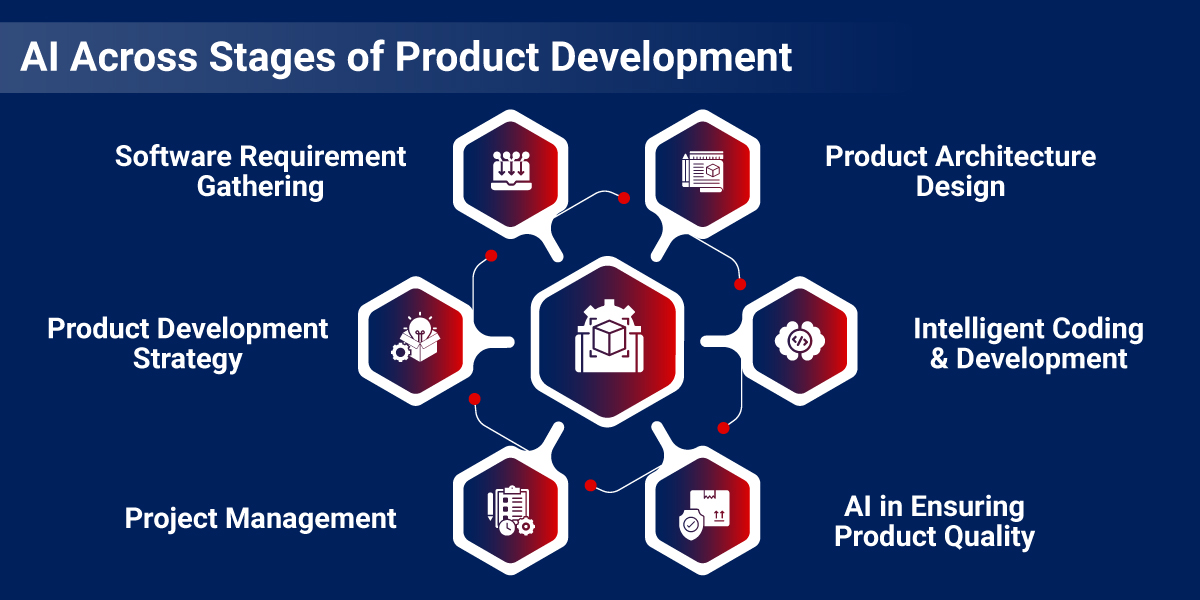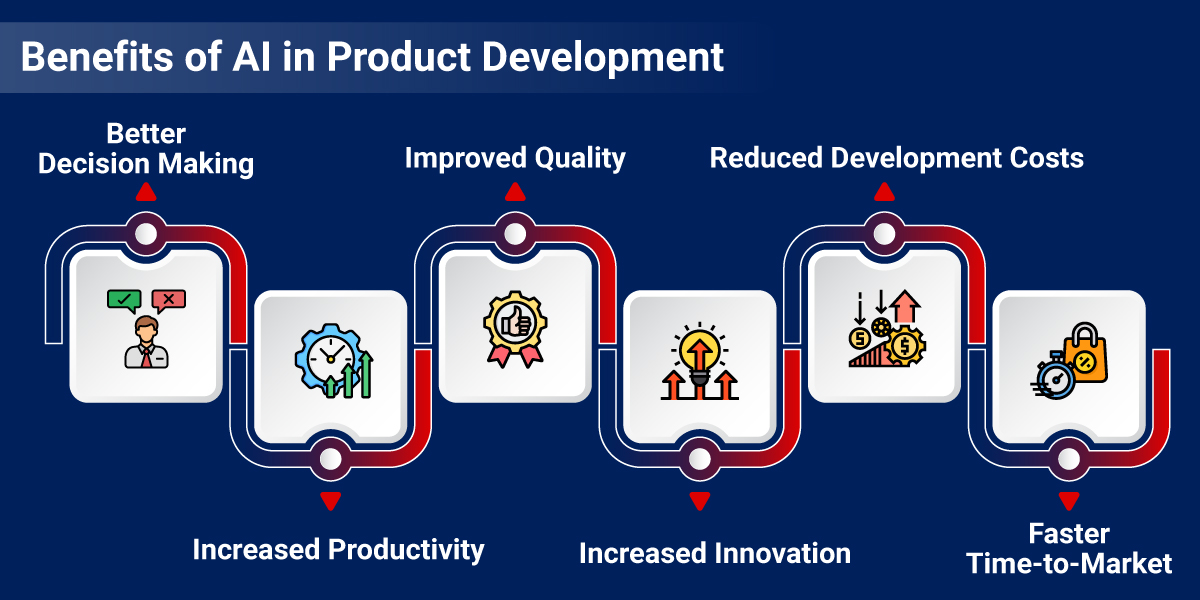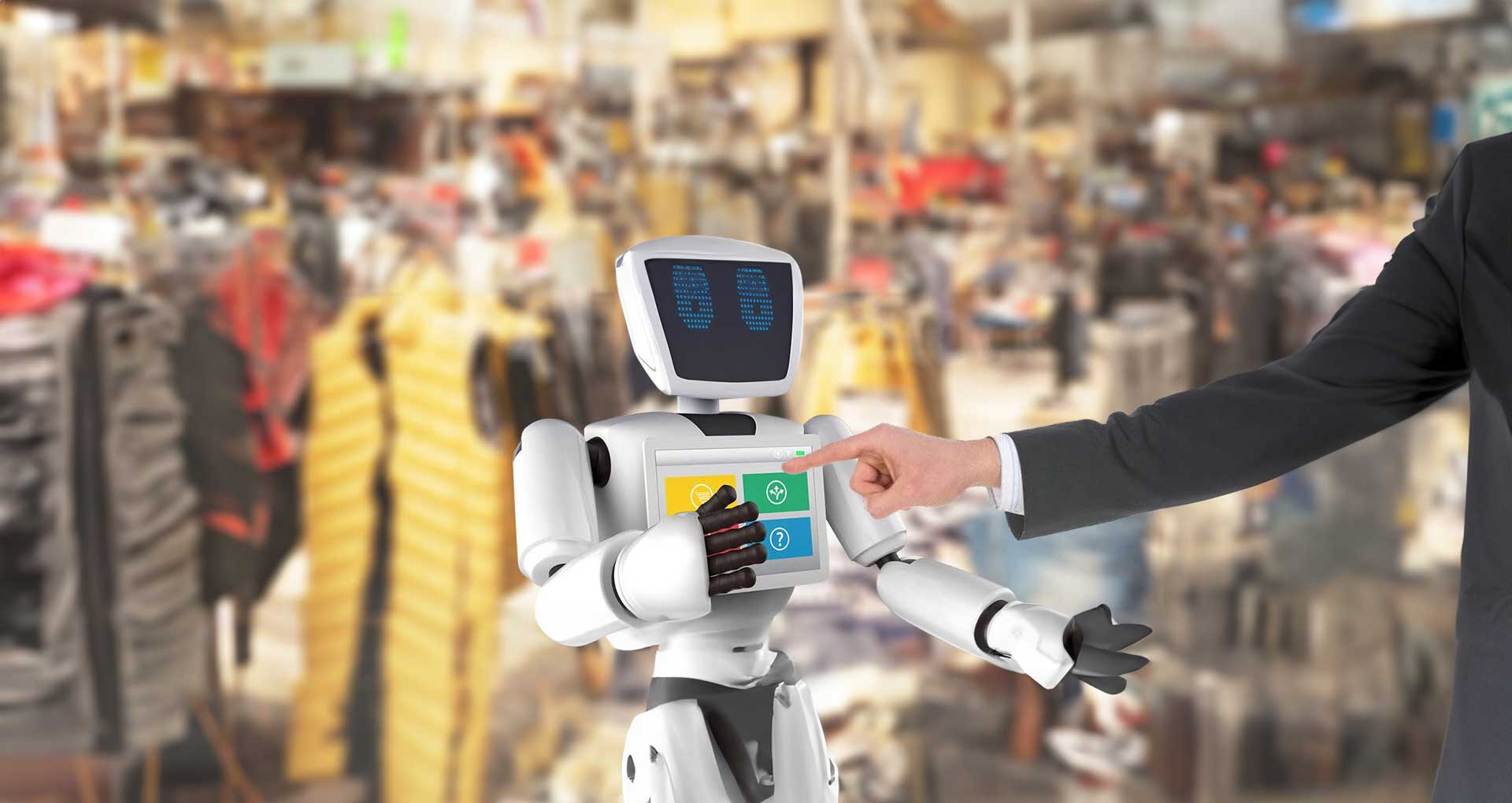Automation is overtaking the process of conceptualizing, building, and maintaining software products with just a quick step called ‘AI integration’ into the development lifecycle. AI in product development holds the potential and opens the ground for smarter development, documentation, deployment, delivery, and debugging to drive innovative software products.
A recent survey highlights the rapid growth of AI in each stage of the software development lifecycle. The survey reveals that 90.9% of companies currently use AI in software product development and have maximized efficiency utilizing AI-based tools, while 75% of the non-adopters plan to integrate AI within the next 12 months[1].
Looking forward to building your own software solution or product? Don’t forget to implement AI-driven tools and solutions in the process. Continue reading this blog to gain more awareness of how Artificial Intelligence in product development accelerates the delivery of tangible products, including AI benefits in software product development, how it is used across the product development lifecycle, key challenges, and their solutions.
Uses of AI in Various Stages of Product Development Lifecycle
The Software product development lifecycle consists of multiple layers, stages, and phases to ensure outcome-oriented deliveries. AI in product development lifecycle can empower processes and, to some extent, speed up each phase’s operations execution for increased productivity and efficiency, thereby hastening the market launch of new services and products. Let’s explore how AI can impact different areas in the SDLC (software development lifecycle).

Software Requirement Gathering: AI’s capability of analyzing large sets of data allows software product development teams to collect insights and identify patterns across various factors, such as past projects, user feedback, and market trends, and to predict project outcomes. NLP can be used for feedback, support tickets, and to pinpoint information from unstructured datasets. AI-enabled tools can further help business analysts create comprehensive requirement documentation that is clear, concise, and easy to understand for the client as well as the software development team.
Product Development Strategy: Integrating Artificial Intelligence in product development strategy helps you achieve three core principles: being customer-centric, implementing a strategic deployment process, and ensuring efficient product management. AI unlocks the data-driven digital product engineering concept. Generative AI, a subset of AI, analyzes vast amounts of data from various sources to assist in brainstorming product ideas, feature listing, and more. It also offers predictive modeling, which helps forecast market trends, user adoption rates, and potential product performance. Thus, AI empowers you to make market-based, informed, data-driven decisions, optimize product features and functionalities, analyze competitors’ data, and align product vision and mission with dynamic market trends.
Project Management: From initiating a project to building it, deploying it, and managing it throughout its lifecycle, AI for product development offers a wide range of effective tools and solutions. It enables product stakeholders, managers, and teams to automate business analysis and track project progress with accurate measures. AI enhances the project management process by optimizing resource allocation and making proactive adjustments based on ML models. AI-powered tools such as Microsoft Project, Asana, Jira, and others automate the procedures of generating and optimizing project timelines, managing risks proactively, focusing on project progress, and increasing the likelihood of project success. According to research, AI will eliminate 80% of project management tasks by AI by 2030[2].
Product Architecture Design: AI tools leverage ML models to analyze past and existing digital product development architecture design and recommend optimal patterns and strategies. It can further predict the impact of factors like cost, time, performance and security, allowing developers to define the structured solution of a software project that not only meets technical and operational requirements but also optimizes attributes, including security, performance, and manageability. AI-driven product development architecture design helps generate UI/UX prototypes and mockups based on design guidelines defined by stakeholders.
Intelligent Coding & Development: An AI-powered code editor with advanced capabilities helps developers by suggesting code completions, recommending refactoring to improve code structure, and automating bug fixing. Generative AI for code generation provides developers with solutions to basic errors, enhancements, and bugs, freeing up time to focus on more creative problem-solving. This increases productivity, code quality, and overall software delivery. AI can boost developer productivity by automating up to 70% of coding tasks [3].
AI in Ensuring Product Quality: AI in product development automates the entire testing process, making it more reliable, efficient, and effective. AI-powered testing tools & software are built to enhance the testing phase. From software product modernization to development, AI is automating repetitive tasks and manual testing approaches, allowing testers to focus on complex testing scenarios. AI also plays a major role in predicting defects in product software, making the testing process more accurate and streamlined.
Benefits of AI in Product Development Lifecycle
From improved accuracy and bug detection to personalized customer experiences, the integration of AI technologies is transforming the way businesses approach product development. Due to the significant benefits of AI, it is predicted that the market for AI in software development is expected to surpass $600 million by 2026[4]. Let’s explore the key benefits:

Better Decision Making: Artificial Intelligence in product development lifecycle creates decision-making, a smart and data-driven process. The software product development services provider can utilize refined data that derive insights and analyzed via AI and ML algorithms on crucial factors of project stages, such as project metrics, on-demand software trends, client requirement charts, etc. It guides project development toward strategic decisions, whereas AI-driven product development is capable of forecasting potential project outcomes, enabling more effective resource allocation, mitigating risks, and ensuring product success in the market.
Increased Productivity: The combination of AI and product development drives and enhances productivity at an extended level among team members and interconnected operations. It automates time-consuming and repetitive tasks involved in software product development, such as code generation for basic and repetitive modules, testing, documentation creation, and prototyping design. Developers, testers, and BAs are empowered to focus on more complex and creative aspects of product development as AI tools can significantly speed up the coding process and even automatically fix bugs earlier in the development cycle which reduces debugging time. Integrating AI optimizes the development workflow, reduces inefficiency, and enhances collaboration between diverse teams. It translates into increased job satisfaction and enhanced productivity.
Improved Quality: Integrating AI into the product development process enhances the quality of the end delivery. How? AI has the capability to detect bugs at an early stage of development, which was previously done during the testing process. This helps in proactive resolution. Additionally, AI can generate all possible test cases for the product, covering a broad area and ensuring reliable software delivery. AI assistance helps developers with optimizations and improvements, leading to higher quality code, best practices, and coding standards across the project.
Increased Innovation: Artificial Intelligence in product development acts as a powerful pillar for driving innovation. The generative capabilities of AI contribute to fostering an environment of innovation by generating ideas after analyzing vast amounts of data from various sources for breakthrough products or features that can create a competitive edge in the market. Quick iterations on prototyping push the innovation boundaries of the team by allowing them to generate and test multiple product concepts or designs quickly. Leveraging AI in software development thus enables companies to explore new possibilities, take calculated risks, and push the boundaries of product innovation.
Reduced Development Costs: Incorporating AI in product development can create a significant impact on various aspects of investment. It helps major entities in development to analyze and optimize, identifying areas to manage future expenses, streamline development, and ensure the best use of resources. Improved quality and reduced error/bug ratios save on rework costs. Better requirement gathering reduces the risk of misunderstandings, saving money by driving the project in the right direction.
Faster Time-to-Market: With its core proficiency in bringing automation and efficiency to the software product development lifecycle, AI accelerates the overall process. This enables faster time to market, which has become a cornerstone in the race to be unique in a competitive marketplace. AI assists in code generation, automates product testing, enhances project management, and streamlines deployment, speeding up the delivery process and ensuring high-quality products.
How to Mitigate the Risks of AI in Software Product Development?
Data Quality and Bias Mitigation
Low-quality and biased data can diminish the effectiveness of AI utilization in product development, leading to biased and unreliable outcomes. This can result in untrustworthy analysis, which can reduce the quality of software development.
Solution: Source high-quality data, perform data cleansing & pre-processing and implement techniques like fairness metrics and data audits.
Security and Privacy
Integrating AI in product development lifecycle can raise concerns related to security and privacy, as AI models are often trained on sensitive data.
Solution: Implement measures to protect the AI model itself from unauthorized access or manipulation by securing data pipelines and exploring privacy-preserving techniques.
Transparency and Explainability
Transparency and explainability are critical challenges faced during the implementation of AI in product development. Many AI and ML algorithms and models primarily operate as “black boxes.” Thus, the absence of transparency can create future problems in development.
Solution: Use interpretable AI models, implement Explainable AI (XAI) techniques, maintain detailed documentation, and conduct rigorous testing.
Partner with Rishabh Software to Integrate AI in Your Software Product Development
With practice-proven expertise in software product development, Rishabh Software prioritizes quality, performance, scalability, and security in all stages of the software product development lifecycle. Our team conducts a 360-degree assessment, meticulously examining your business needs, requirements, and technical infrastructure. With the integration of AI, we ensure rigorous quality assurance benchmarks are met in order to deliver a robust and secure software solution.
As a leading software product engineering company, we excel in everything from requirement gathering to providing comprehensive support throughout product initiation, development, deployment, and maintenance. We guide projects from the pre-lifecycle stages to maturity with expertise and dedication. By leveraging diverse technology & solutions containing Cloud, IoT, AI, and more, our expert team fosters innovation in AI product development, empowering businesses to stay ahead in the competitive tech landscape.
Frequently Asked Question
Q: What is AI in product development?
A: Artificial Intelligence in product development involves integrating AI-powered solutions, tools, and software to enhance the software product development lifecycle stages. This includes utilizing AI algorithms and machine learning models to enhance product design, optimize production processes, personalize user experiences, and ensure product quality.
Q: How does AI impact the product development timeline?
A: AI, with its capabilities of automating tasks, can help teams rapidly move from one stage to another with accuracy and quality. By analyzing data and generating insights, AI aids in making faster decisions and predicting outcomes.
Q: What are the future trends of AI in product development?
A: Future trends of AI in software product development will be included:
- Predictive Bug Detection and Remediation
- Generative AI for Software Design and Prototyping
- Automated Software Documentation Creation
- AI-Assisted Software Testing and Quality Assurance
- Responsible AI Development
- Explainable AI (XAI) Techniques
Footnotes:
2. https://hbr.org/2023/02/how-ai-will-transform-project-management
3. https://www.bitsathy.ac.in/ai-impact-on-software-development-jobs/
4. https://www.industryarc.com/Report/18545/software-development-ai-market.html











 30 Min
30 Min


